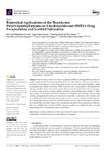Biomedical Applications of the Biopolymer Poly(3-hydroxybutyrate-co-3-hydroxyvalerate) (PHBV): Drug Encapsulation and Scaffold Fabrication

Ver/Abrir
Use este enlace para citar
http://hdl.handle.net/2183/34047
Excepto si se señala otra cosa, la licencia del ítem se describe como Creative Commons Attribution 4.0 International Licence (CC-BY 4.0)
Colecciones
- Investigación (FCS) [1293]
Metadatos
Mostrar el registro completo del ítemTítulo
Biomedical Applications of the Biopolymer Poly(3-hydroxybutyrate-co-3-hydroxyvalerate) (PHBV): Drug Encapsulation and Scaffold FabricationAutor(es)
Fecha
2023-07-19Cita bibliográfica
Rodríguez-Cendal AI, Gómez-Seoane I, de Toro-Santos FJ, Fuentes-Boquete IM, Señarís-Rodríguez J, Díaz-Prado SM. Biomedical Applications of the Biopolymer Poly(3-hydroxybutyrate-co-3-hydroxyvalerate) (PHBV): drug Encapsulation and Scaffold Fabrication. Int J Mol Sci. 2023 Jul 19;24(14):11674.
Resumen
[Abstract] Poly(3-hydroxybutyrate-co-3-hydroxyvalerate) (PHBV) is a biodegradable and biocompatible biopolymer that has gained popularity in the field of biomedicine. This review provides an overview of recent advances and potential applications of PHBV, with special emphasis on drug encapsulation and scaffold construction. PHBV has shown to be a versatile platform for drug delivery, offering controlled release, enhanced therapeutic efficacy, and reduced side effects. The encapsulation of various drugs, such as anticancer agents, antibiotics, and anti-inflammatory drugs, in PHBV nanoparticles or microspheres has been extensively investigated, demonstrating enhanced drug stability, prolonged release kinetics, and increased bioavailability. Additionally, PHBV has been used as a scaffold material for tissue engineering applications, such as bone, cartilage, and skin regeneration. The incorporation of PHBV into scaffolds has been shown to improve mechanical properties, biocompatibility, and cellular interactions, making them suitable for tissue engineering constructs. This review highlights the potential of PHBV in drug encapsulation and scaffold fabrication, showing its promising role in advancing biomedical applications.
Palabras clave
Poly(3-hydroxybutyrate-co-3-hydroxyvalerate) (PHBV)
Drug delivery
Encapsulation
Nanoparticle
Polyhydroxyalkanoates (PHA)
Regeneration
Scaffolds
Drug delivery
Encapsulation
Nanoparticle
Polyhydroxyalkanoates (PHA)
Regeneration
Scaffolds
Descripción
Review
Versión del editor
Derechos
Creative Commons Attribution 4.0 International Licence (CC-BY 4.0)
ISSN
1422-0067






